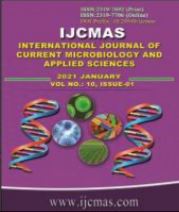


 National Academy of Agricultural Sciences (NAAS)
National Academy of Agricultural Sciences (NAAS)

|
PRINT ISSN : 2319-7692
Online ISSN : 2319-7706 Issues : 12 per year Publisher : Excellent Publishers Email : editorijcmas@gmail.com / submit@ijcmas.com Editor-in-chief: Dr.M.Prakash Index Copernicus ICV 2018: 95.39 NAAS RATING 2020: 5.38 |
The study was conducted in purposively selected three taluks of Chickballapura district. Total sample of 271respondents were purposively selected for the study. The data were collected by using structured interview schedule and analyzed by using appropriate statistical tools It was observed that livelihood security of respondents in less satisfied category decreased by 10.33 per cent, satisfied category increased by 1.85 per cent and highly satisfied category improved by 8.48 per cent after implementation of the project. Out of seven dimensions it was observed that employment security increased by 39.35 percent, living amenities increased by 30.82 per cent, coping strategies against stress increased by 30.75 per cent, ecological security increased by 30.00 percent, economic efficiency increased by 28.95 per cent, assets increased by 25.71 per cent and social equitability increased by 24.41 per cent. Overall livelihood security improved by 30.23 per cent increase after implementation of project. The average yield of ragi increased by 46.15 per cent, groundnut increased by 33.33 per cent. The livestock components (cow and sheep) generate 345 mandays employment per year and provide additional net income of Rs. 60000. In 2018 reported that the average gross income of Rs. 103264 from both crop and livestock enterprises of IFS against Rs. 6956 before implementation of the project. In total respondents could realize about Rs. 70300 net profit by adopting intercropping and livestock components in IFS. As such, for every one rupee investment under IFS they are getting 3.13 rupee income. The characteristics such as land holding, cropping pattern, livestock possession, cosmopoliteness, innovativeness, extension participation, social participation, management orientation, training undergone, willingness towards IFS and access to resources exhibited significant relationship with farmers livelihood security. Hence, the concerned development departments should organize the demonstrations, trainings, field days, exposure visits etc., to educate the farmers about IFS. The positive and significantly related characteristics need to be considered while selecting farmers for the extension educational programmes to enhance their livelihood security through IFS.
 |
 |
 |
 |
 |